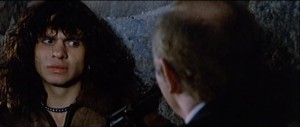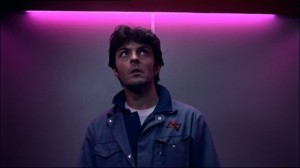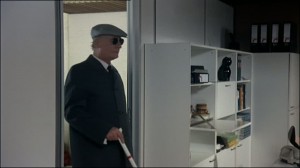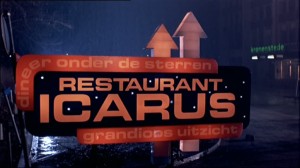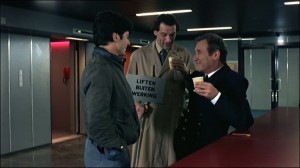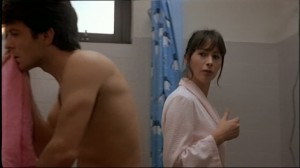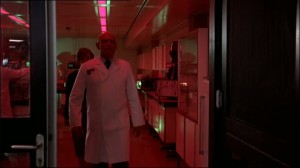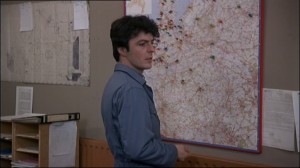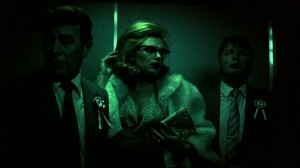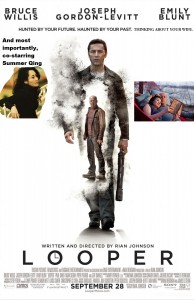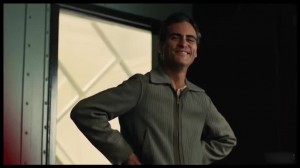 One of comedian Pete Holmes’ best physical bits has him showing the audience how he likes to stand, with his arms at his sides and with his back arched as he juts his stomach out.
One of comedian Pete Holmes’ best physical bits has him showing the audience how he likes to stand, with his arms at his sides and with his back arched as he juts his stomach out.
“Everybody knows that this is the most comfortable way to stand. I want to stand like a pregnant woman stirring chicken soup for a needy child. Like an uppercase S. Small minded people think this makes me look gay. Men are supposed to stand straight up but it’s not comfortable. I like vaginal intercourse and standing like this. About the same.”
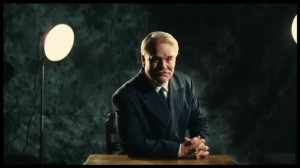 So in Paul Thomas Anderson’s The Master, when Joaquin Phoenix’s character Freddy Quell, a seriously troubled WWII vet and alcoholic in 1950, begins standing like Pete Holmes and, perhaps, all weak-willed but sexually assured men, one can’t help wonder if this is supposed to be considered part of his progress. Will his Brando-isms (such as indecipherable mumbling and a short temper) remain after he’s been thoroughly exhausted by the title character and L. Ron Hubbard surrogate, Lancaster Dodd? Dodd is played, by Phillip Seymour Hoffman with a large dollop of effete Britishness combined with a small serving of American bluster. And since, as Dodd insists to Freddy that “I’m the only one who likes you,” is Freddy’s cosmetic conversion also a sign of a sexual conversion?
So in Paul Thomas Anderson’s The Master, when Joaquin Phoenix’s character Freddy Quell, a seriously troubled WWII vet and alcoholic in 1950, begins standing like Pete Holmes and, perhaps, all weak-willed but sexually assured men, one can’t help wonder if this is supposed to be considered part of his progress. Will his Brando-isms (such as indecipherable mumbling and a short temper) remain after he’s been thoroughly exhausted by the title character and L. Ron Hubbard surrogate, Lancaster Dodd? Dodd is played, by Phillip Seymour Hoffman with a large dollop of effete Britishness combined with a small serving of American bluster. And since, as Dodd insists to Freddy that “I’m the only one who likes you,” is Freddy’s cosmetic conversion also a sign of a sexual conversion?
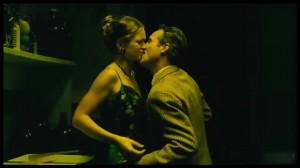 Scientology, which long winded, hacky sci-fi writer Hubbard was the founder of, has always had a no-tolerance policy on homosexuality, hence many of most famous members (Tom Cruise, John Travolta, etc.) have had swirling rumors about their private lives for decades. And like every Paul Thomas Anderson film, The Master primarily deals with a toxic father-son relationship that is about to come to a head (Magnolia, Boogie Nights, Hard Eight, There Will Be Blood), so looking at such an incestuous subtext is not out of bounds. It certainly pops up throughout The Master, as Dodd’s grown-up daughters from previous marriages are doppelgangers for his current, much younger wife (played by Amy Adams as a domineering, borderline shrew). Freddy Quell, a petty thief who scavenges* for whatever he can find under your sink so he can mix it with whatever is in his flask, is basically Dodd, who has a slew of phony doctorates and qualifications, if Dodd had had shell shock and little personal charm. Freddy, who is very direct about his sexual advances (he acts like a 6 year old who just discovered what his penis is for), is Dodd’s id**, The pure, sloppy macho that exemplifies most of the worst parts of him, and all of his natural impulses. So when, in the midst of his first real interrogation of Freddy, Dodd asks him if he’s ever “had sexual relations with a relative,” which Freddy freely admits to, it’s as if Dodd was saying “well, I did, so you must have.”
Scientology, which long winded, hacky sci-fi writer Hubbard was the founder of, has always had a no-tolerance policy on homosexuality, hence many of most famous members (Tom Cruise, John Travolta, etc.) have had swirling rumors about their private lives for decades. And like every Paul Thomas Anderson film, The Master primarily deals with a toxic father-son relationship that is about to come to a head (Magnolia, Boogie Nights, Hard Eight, There Will Be Blood), so looking at such an incestuous subtext is not out of bounds. It certainly pops up throughout The Master, as Dodd’s grown-up daughters from previous marriages are doppelgangers for his current, much younger wife (played by Amy Adams as a domineering, borderline shrew). Freddy Quell, a petty thief who scavenges* for whatever he can find under your sink so he can mix it with whatever is in his flask, is basically Dodd, who has a slew of phony doctorates and qualifications, if Dodd had had shell shock and little personal charm. Freddy, who is very direct about his sexual advances (he acts like a 6 year old who just discovered what his penis is for), is Dodd’s id**, The pure, sloppy macho that exemplifies most of the worst parts of him, and all of his natural impulses. So when, in the midst of his first real interrogation of Freddy, Dodd asks him if he’s ever “had sexual relations with a relative,” which Freddy freely admits to, it’s as if Dodd was saying “well, I did, so you must have.”
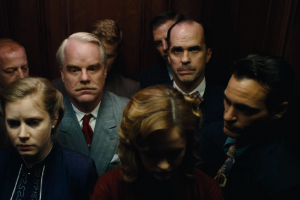 Anderson makes it immediately clear that everything is askew When Freddy, on the run from Filipino farmers who claim he poisoned one of their own***, hides out on what turns out to be Dodd’s [borrowed] boat, the American flag on the boat flies at half-mast. When Freddy wakes up confused, he’s taken to see Dodd who assures him that he will be allowed to stay on the boat if he can make more of his alcohol/cleaning fluid concoctions. Freddy throws something together and they toast “to poison.”
Anderson makes it immediately clear that everything is askew When Freddy, on the run from Filipino farmers who claim he poisoned one of their own***, hides out on what turns out to be Dodd’s [borrowed] boat, the American flag on the boat flies at half-mast. When Freddy wakes up confused, he’s taken to see Dodd who assures him that he will be allowed to stay on the boat if he can make more of his alcohol/cleaning fluid concoctions. Freddy throws something together and they toast “to poison.”
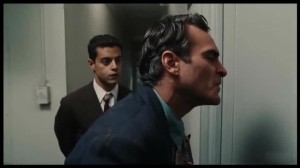 Now, with his bloodshot eyes and hunched over posture, Freddy already looks like Mr. Hyde (Phoneix very much resembles his Return to Paradise character, after he’s been executed) so the fact that they begin their relationship by celebrating such a potion isn’t a surprise. It also sets up Anderson to explore his pet themes, wherein a lost, tortured, but volatile soul will come up against a monstrous domineering figure. They will go head to head and they may switch roles, as the monster becomes the bully and the bully becomes the monster****. His films, like Hard Eight, Boogie Nights, and Magnolia, were about crumbling families and the monsters and bullies that destroy them. And his father, the late Ernie Anderson, was a literal “monster,” the TV-horror host Ghoulardi. But since the younger Anderson started his own family in 2005 (with actress Maya Rudolph, with whom he has three kids), the films have become more intimate, such as in There Will Be Blood which is primarily a battle between Daniel and Eli.
Now, with his bloodshot eyes and hunched over posture, Freddy already looks like Mr. Hyde (Phoneix very much resembles his Return to Paradise character, after he’s been executed) so the fact that they begin their relationship by celebrating such a potion isn’t a surprise. It also sets up Anderson to explore his pet themes, wherein a lost, tortured, but volatile soul will come up against a monstrous domineering figure. They will go head to head and they may switch roles, as the monster becomes the bully and the bully becomes the monster****. His films, like Hard Eight, Boogie Nights, and Magnolia, were about crumbling families and the monsters and bullies that destroy them. And his father, the late Ernie Anderson, was a literal “monster,” the TV-horror host Ghoulardi. But since the younger Anderson started his own family in 2005 (with actress Maya Rudolph, with whom he has three kids), the films have become more intimate, such as in There Will Be Blood which is primarily a battle between Daniel and Eli.
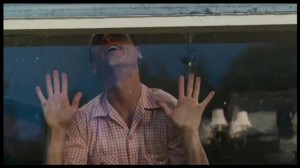 In The Master, the intimacy has grown to the point where Anderson no longer feels the need to be a stylistic show-off, so the film isn’t flashy, and it’s his first film not to be shot in the cinemascope ratio. And yet he shot the film in 70MM, a giant format generally reserved for epics, and hasn’t been used on a narrative feature since Kenneth Branagh’s 1996 adaptation of Hamlet. So why would you shoot a mostly 2 character piece on film stock as expensive and antiquated as 70MM*****? Maybe he wanted to emulate the ultimate in intimate epics, that being David Lean’s Lawrence of Arabia?
In The Master, the intimacy has grown to the point where Anderson no longer feels the need to be a stylistic show-off, so the film isn’t flashy, and it’s his first film not to be shot in the cinemascope ratio. And yet he shot the film in 70MM, a giant format generally reserved for epics, and hasn’t been used on a narrative feature since Kenneth Branagh’s 1996 adaptation of Hamlet. So why would you shoot a mostly 2 character piece on film stock as expensive and antiquated as 70MM*****? Maybe he wanted to emulate the ultimate in intimate epics, that being David Lean’s Lawrence of Arabia?
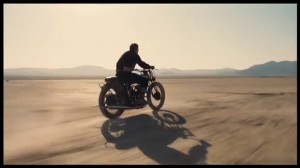 And my comparison to Lawrence of Arabia is not incidental, because there’s a scene in The Master that opens its rickety and undernourished final act, where Dodd (along with his daughter and son-in-law) takes Freddy to the Death Valley Salt Flats to race a motorcycle. Anderson doesn’t steal from David Lean in this sequence in the way you’d expect. The most famous shot from Lawrence of Arabia has what looks to be a desert mirage of a man on a camel, and the shot just holds for several minutes as the image becomes more and more clear that it isn’t a mirage, but a real man. The key to the effect of the scene is not just the extraordinary photography, but the way that silence and reaction shots are used. The two characters watching this figure are stunned, but say nothing to each other and simply stare into the distance as the potential danger gets closer and closer. In The Master, Anderson just gives us the staring and the feeling that something terrible is about to happen, otherwise why would he show Dodd going as fast as he can and encouraging Freddy to do the same? There’s nothing previously established about either of the characters regarding their interest in motorcycles, so unless there’s a potential fatal accident, why else show it to us? [Don’t worry, this is not a spoiler.]
And my comparison to Lawrence of Arabia is not incidental, because there’s a scene in The Master that opens its rickety and undernourished final act, where Dodd (along with his daughter and son-in-law) takes Freddy to the Death Valley Salt Flats to race a motorcycle. Anderson doesn’t steal from David Lean in this sequence in the way you’d expect. The most famous shot from Lawrence of Arabia has what looks to be a desert mirage of a man on a camel, and the shot just holds for several minutes as the image becomes more and more clear that it isn’t a mirage, but a real man. The key to the effect of the scene is not just the extraordinary photography, but the way that silence and reaction shots are used. The two characters watching this figure are stunned, but say nothing to each other and simply stare into the distance as the potential danger gets closer and closer. In The Master, Anderson just gives us the staring and the feeling that something terrible is about to happen, otherwise why would he show Dodd going as fast as he can and encouraging Freddy to do the same? There’s nothing previously established about either of the characters regarding their interest in motorcycles, so unless there’s a potential fatal accident, why else show it to us? [Don’t worry, this is not a spoiler.]
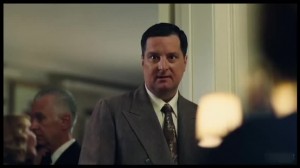 Honestly, I don’t know why the Salt Flats scene is there, because while most of the film takes place over a few months (which you can gauge by how pregnant Amy Adams appears in a scene), after the motorcycle racing, The Master moves forward what appears to be several years. There seems to be a large gap of either material deleted to shorten the film (at the behest of distributor Harvey Weinstein?), or Anderson simply never worked it out. Don’t get me wrong, I’d be interested in seeing The Master 2: Ghost Protocol or Look Who’s Master Now, but as with Kenneth Lonergan’s highly flawed theatrical cut of Margaret******, it appears that most of this material needs not just elaboration, but a complete overhaul.
Honestly, I don’t know why the Salt Flats scene is there, because while most of the film takes place over a few months (which you can gauge by how pregnant Amy Adams appears in a scene), after the motorcycle racing, The Master moves forward what appears to be several years. There seems to be a large gap of either material deleted to shorten the film (at the behest of distributor Harvey Weinstein?), or Anderson simply never worked it out. Don’t get me wrong, I’d be interested in seeing The Master 2: Ghost Protocol or Look Who’s Master Now, but as with Kenneth Lonergan’s highly flawed theatrical cut of Margaret******, it appears that most of this material needs not just elaboration, but a complete overhaul.
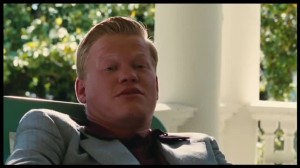 Part of the problem is that I’m not sure it was a good idea to suggest that any of Dodd’s family doesn’t believe in his manufactured religion, because the movie then begins to seem more like a caper movie, instead of something that could affect thousands of people in the future. That’s why when Freddy appears to use Dodd’s teachings as a post-coital pick-up line, it diminishes the film, because we thought that at least Freddy took it seriously. It’s a shame because there are so many fascinatingly bizarre and ambiguous moments that linger, especially regarding Freddy’s love life before the war.
Part of the problem is that I’m not sure it was a good idea to suggest that any of Dodd’s family doesn’t believe in his manufactured religion, because the movie then begins to seem more like a caper movie, instead of something that could affect thousands of people in the future. That’s why when Freddy appears to use Dodd’s teachings as a post-coital pick-up line, it diminishes the film, because we thought that at least Freddy took it seriously. It’s a shame because there are so many fascinatingly bizarre and ambiguous moments that linger, especially regarding Freddy’s love life before the war.
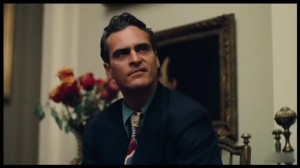 Is the girl that he longs for a figment of his imagination? Are the flashbacks we see with them supposed to be a distortion, which is why this young teenage girl absolutely towers over Freddy (like Lilly Tomlin’s character Edith Ann, who is dwarfed by a massive rocking chair), but visually, he appears to be in his mid-30s? The final scenes unsatisfactorily answer these questions, and the creepy notion of a 30 year old man with a 15 or 16 year old is never dealt with, not even by the girl’s parents.
Is the girl that he longs for a figment of his imagination? Are the flashbacks we see with them supposed to be a distortion, which is why this young teenage girl absolutely towers over Freddy (like Lilly Tomlin’s character Edith Ann, who is dwarfed by a massive rocking chair), but visually, he appears to be in his mid-30s? The final scenes unsatisfactorily answer these questions, and the creepy notion of a 30 year old man with a 15 or 16 year old is never dealt with, not even by the girl’s parents.
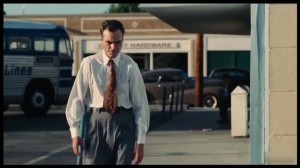
Joaquin looks like a gaunt Mormon in that suit.
But Anderson overcomes the flaws because the major contradiction in Hubbard’s teaching merges with another one of Anderson’s frequent themes, that being the underclass and criminal element looking for legitimacy, trying to cleanse themselves of any previous negative association. Hubbard famously tried to recruit actors (and/or celebrities) in order to best “disseminate the message” to the widest possible audience. But the process of Scientology (and the version presented in The Master) involves removing as much negativity as possible, until a person is “clear.” Of course, taking away all perceived emotional pain would leave little for actors to draw on, which may be why Scientologists at the top of the pyramid like Tom Cruise and John Travolta often succeed in roles where they are “movie stars” instead of actors. In other words, they are essentially playing themselves. Or what’s left of them anyway. Sometimes a little fear, pain, and shame can be good for you. Otherwise who would ever have the guts to stand like Pete Holmes?
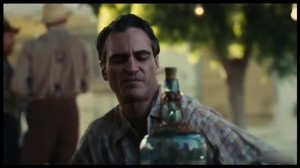 * Since Joaquin Phoenix’s self-imposed hiatus in 2008 (his last film, apart from the “experimental” I’m Still Here, was the undervalued Two Lovers, featuring one of his best performances), Michael Shannon has taken over all of the creepy/mumbly miscreant roles.
* Since Joaquin Phoenix’s self-imposed hiatus in 2008 (his last film, apart from the “experimental” I’m Still Here, was the undervalued Two Lovers, featuring one of his best performances), Michael Shannon has taken over all of the creepy/mumbly miscreant roles.
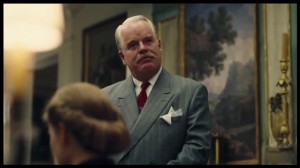 ** Whether he was aware of it or not, as tensions begin to mount about the validity of Dodd’s spiritual creation, Hoffman furrows his brow and starts acting with his pineal gland. The pineal gland, which is supposed to be a human being’s “third eye,” has been used in movies in the past as an expression of unfiltered sexuality, such as in From Beyond. I’m made an audio slideshow for those who are curious (not safe for work).
** Whether he was aware of it or not, as tensions begin to mount about the validity of Dodd’s spiritual creation, Hoffman furrows his brow and starts acting with his pineal gland. The pineal gland, which is supposed to be a human being’s “third eye,” has been used in movies in the past as an expression of unfiltered sexuality, such as in From Beyond. I’m made an audio slideshow for those who are curious (not safe for work).
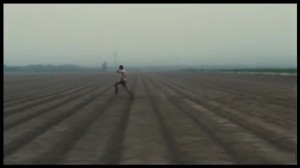 *** One of Anderson’s surreal visual touches is for Freddy to run out of what looks like an outhouse onto a field of fallow crops. The shot is framed so it looks like the four or five people must have been packed very tightly, as if it were a clown car.
*** One of Anderson’s surreal visual touches is for Freddy to run out of what looks like an outhouse onto a field of fallow crops. The shot is framed so it looks like the four or five people must have been packed very tightly, as if it were a clown car.
**** Hard Eight has Sydney (Philip Baker Hall), the monster, mentoring John (John C. Reilly). Sydney then faces off against Jimmy (Samuel L. Jackson), the bully.
Boogie Nights has Jack Horner (Burt Reynolds) mentor Dirk Diggler (Mark Wahlberg), who has to face off with both Floyd Gondoli (Philip Baker Hall) who is on the scene to usher in the impending dominance of video in the porn industry, and what Dirk turns into. Then Dirk has to face his own demons and the deluded stripper Todd Parker (Thomas Jane) in the final scenes.
Magnolia has several sets of abusive fathers dying of cancer, with Claudia Gator (Melora Walters) refusing to forgive her sexually abusive father Jimmy Gator (Philip Baker Hall), and the sexual bully Frank Mackey (Tom Cruise) raging against Earl Patridge (Jason Robards), his mentally abusive father.
Punch Drunk Love has the meek Barry Egan (Adam Sandler) go up against the Mattress Man (Philip Seymour Hoffman). Initially bullied successfully over the phone, Barry then confronts the Mattress Man directly.
There Will Be Blood is Daniel Plainview (Daniel Day-Lewis) mentoring Eli (Paul Dano) and Eli becoming the bigger monster before they finally face off.
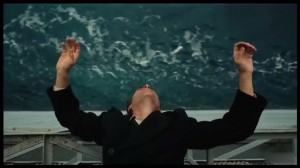 ***** Also referred to as 65MM.
***** Also referred to as 65MM.
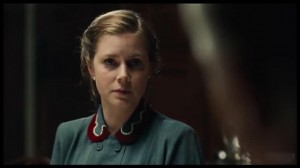 ****** The extended cut of Margaret, originally only released through Amazon.com as part of a 2 pack with the theatrical cut on Blu-ray and the DVD containing the longer version (but is supposedly losing its exclusivity this October), fulfills all the promise that the film hinted at in the test screening I saw 6 years ago. It’s a complete vision, untangling all of the narrative issues present in the other versions (especially with regards to Matt Damon’s subplot), while throwing in one acute observation about human nature after another. Scene after scene is so smart and overwhelming, with thorough character development, and some of the best female roles seen in years. While my favorite moment from the original rough cut is missing (where Jeannie Berlin tells Anna Paquin to “stop managing” her), this 3 hour cut actually earns its literally operatic final moments, as opposed to the other two cuts, which just kind of stumbled into them, ending because it just seemed like the right moment to do so.
****** The extended cut of Margaret, originally only released through Amazon.com as part of a 2 pack with the theatrical cut on Blu-ray and the DVD containing the longer version (but is supposedly losing its exclusivity this October), fulfills all the promise that the film hinted at in the test screening I saw 6 years ago. It’s a complete vision, untangling all of the narrative issues present in the other versions (especially with regards to Matt Damon’s subplot), while throwing in one acute observation about human nature after another. Scene after scene is so smart and overwhelming, with thorough character development, and some of the best female roles seen in years. While my favorite moment from the original rough cut is missing (where Jeannie Berlin tells Anna Paquin to “stop managing” her), this 3 hour cut actually earns its literally operatic final moments, as opposed to the other two cuts, which just kind of stumbled into them, ending because it just seemed like the right moment to do so.
 Here is a podcast/radio interview from my appearance on Morning Feed with Ed Feldman from October of 2011, when I was promoting the Medium Rare Cinema screenings of Dream Lover and Comfort and Joy. Like my other appearances on Morning Feed, the topics are wide ranging starting with Harry Dean Stanton and Death Watch and concluding 2 hours later with a brief reference to Ilsa star Dyanne Thorne. In between there are discussions of Emilio Estevez’s magnum opus Wisdom, what a wonderful blowhard Oliver Stone is, how death is always the most efficient way to win an Oscar, what really happened to Orson Welles during the editing of The Magnificent Ambersons, and a slew of other free floating randomness. (more…)
Here is a podcast/radio interview from my appearance on Morning Feed with Ed Feldman from October of 2011, when I was promoting the Medium Rare Cinema screenings of Dream Lover and Comfort and Joy. Like my other appearances on Morning Feed, the topics are wide ranging starting with Harry Dean Stanton and Death Watch and concluding 2 hours later with a brief reference to Ilsa star Dyanne Thorne. In between there are discussions of Emilio Estevez’s magnum opus Wisdom, what a wonderful blowhard Oliver Stone is, how death is always the most efficient way to win an Oscar, what really happened to Orson Welles during the editing of The Magnificent Ambersons, and a slew of other free floating randomness. (more…)


